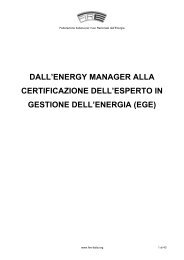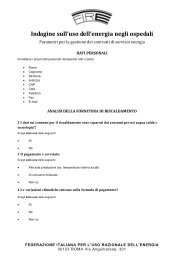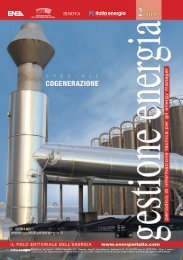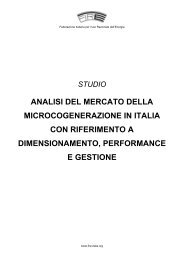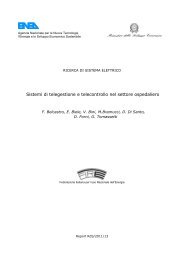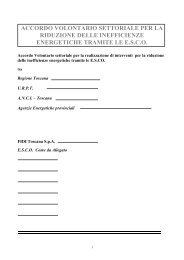part 1: overview of cogeneration and its status in asia - Fire
part 1: overview of cogeneration and its status in asia - Fire
part 1: overview of cogeneration and its status in asia - Fire
You also want an ePaper? Increase the reach of your titles
YUMPU automatically turns print PDFs into web optimized ePapers that Google loves.
84 Part II: Cogeneration experiences <strong>in</strong> Asia <strong>and</strong> elsewhere<br />
PURPA requires electric utilities to <strong>of</strong>fer to sell electric energy to qualify<strong>in</strong>g <strong>cogeneration</strong><br />
facilities <strong>and</strong> qualify<strong>in</strong>g small power production facilities, <strong>and</strong> purchase electricity from such<br />
facilities. Importantly, PURPA was <strong>in</strong>tended to accomplish <strong>its</strong> objectives while protect<strong>in</strong>g<br />
consumers from hav<strong>in</strong>g to pay more for power from cogenerators than they would pay for<br />
power produced or purchased by the utility. The benef<strong>its</strong> enjoyed by a <strong>cogeneration</strong> facility<br />
under PURPA are significant. These are:<br />
1. Advantageous buy-back rate treatment for sales <strong>of</strong> cogenerated electricity: Utilities may<br />
negotiate to pay up to their avoided costs to purchase cogenerated power;<br />
2. Ease <strong>of</strong> <strong>in</strong>terconnection <strong>and</strong> backup service: Expensive equipment redundancy for<br />
reliability is no longer required. However, <strong>cogeneration</strong> systems are still required to meet<br />
the utility’s safety <strong>and</strong> protection conditions while <strong>in</strong>terconnected to the grids;<br />
3. Supplemental Utility backup power at reasonable rates: Utilities cannot discrim<strong>in</strong>ate<br />
aga<strong>in</strong>st cogenerators by charg<strong>in</strong>g unreasonably high rates for supplemental power;<br />
4. Exemption from federal <strong>and</strong> state utility regulations: Qualify<strong>in</strong>g <strong>cogeneration</strong> facilities are<br />
exempt from public utility regulations. The expense <strong>of</strong> report<strong>in</strong>g <strong>and</strong> the compliance<br />
burden associated with the Federal Energy Regulatory Commission (FERC) <strong>and</strong> state<br />
utility commissions can be avoided.<br />
Besides the benef<strong>its</strong> mentioned above, other favourable regulations <strong>in</strong>tended to ease<br />
adm<strong>in</strong>istrative burdens for cogenerators to seek exemptions <strong>and</strong> to elim<strong>in</strong>ate fuel use<br />
restrictions for <strong>in</strong>dustrial cogenerators are mentioned below.<br />
Exemption from Fuel Use Act for Us<strong>in</strong>g Oil <strong>and</strong> Natural Gas: Fuel Use Act (FUA) <strong>of</strong> 1978<br />
prohib<strong>its</strong> the use <strong>of</strong> oil <strong>and</strong> natural gas <strong>in</strong> exist<strong>in</strong>g power plants <strong>and</strong> major fuel burn<strong>in</strong>g<br />
<strong>in</strong>stallations if the facilities have or could have the capability <strong>of</strong> burn<strong>in</strong>g coal or another<br />
alternative fuel. New power plants <strong>and</strong> major fuel burn<strong>in</strong>g <strong>in</strong>stallations with boilers cannot be<br />
built without the capability <strong>of</strong> us<strong>in</strong>g coal or another alternative fuel. A new or exist<strong>in</strong>g<br />
cogenerator has to obta<strong>in</strong> an exemption from the Economic Regulatory Adm<strong>in</strong>istration for<br />
us<strong>in</strong>g oil <strong>and</strong> natural gas.<br />
Exemption from Natural Gas Incremental Pric<strong>in</strong>g: The Natural Gas Policy Act <strong>of</strong> 1978<br />
(NGPA) requires all <strong>in</strong>cremental cost <strong>in</strong>creases <strong>in</strong>curred as a result <strong>of</strong> the phased<br />
deregulation <strong>of</strong> natural gas well-head prices to be passed to customers who burn natural gas<br />
<strong>in</strong> non-exempt <strong>in</strong>dustrial boilers <strong>and</strong> other non-exempt <strong>in</strong>dustrial facilities def<strong>in</strong>ed by the<br />
FERC. NGPA authorizes the FERC to exempt cogenerators from <strong>in</strong>cremental pric<strong>in</strong>g.<br />
Energy Tax Cred<strong>its</strong>: Energy tax cred<strong>its</strong> were established for various qualified <strong>cogeneration</strong><br />
components by two energy laws, the Energy Tax Act (ETA) <strong>of</strong> 1978 <strong>and</strong> the Crude Oil<br />
W<strong>in</strong>dfall Pr<strong>of</strong><strong>its</strong> Tax Act (COWPTA) <strong>of</strong> 1980.<br />
Cogeneration equipment <strong>in</strong>vestments are not specifically addressed <strong>in</strong> the ETA. However,<br />
certa<strong>in</strong> components used <strong>in</strong> the <strong>cogeneration</strong> system such as waste heat boilers, preheaters,<br />
economizers, etc., can qualify for a 10 per cent energy tax credit <strong>in</strong> addition to the regular 10<br />
per cent <strong>in</strong>vestment tax credit.<br />
Between January 1, 1980 <strong>and</strong> December 31, 1982, the COWPTA provided a 10 per cent,<br />
non-refundable energy credit for qualified <strong>in</strong>vestments <strong>in</strong> <strong>cogeneration</strong> equipment that have a<br />
five-year or longer operat<strong>in</strong>g life <strong>and</strong> a 6 per cent credit for qualify<strong>in</strong>g <strong>cogeneration</strong> facilities<br />
that have a three to five-year life.<br />
Tax-Exempt F<strong>in</strong>anc<strong>in</strong>g: State <strong>and</strong> local power authorities <strong>and</strong> other government-owned<br />
electric utilities may issue tax-exempt bonds (exempt from federal <strong>in</strong>come tax) <strong>and</strong> use the<br />
proceeds <strong>of</strong> the bond to f<strong>in</strong>ance the construction <strong>of</strong> <strong>cogeneration</strong> systems. However, if an



